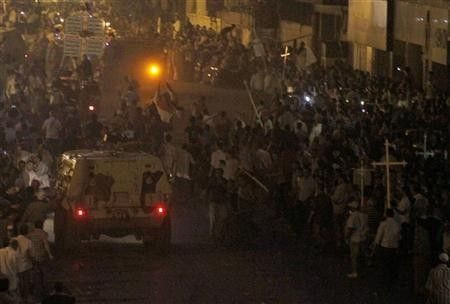After Deadly Protests in Egypt, the New Boss Looks Like the Old Boss

The pattern seemed familiar: protesters march through the streets, the military cracks down and the government exonerates itself by blaming outside forces or sectarian tensions.
To some Egyptians, a weekend demonstration that led to the deaths of two dozen mostly Coptic Christian protesters illustrated the continuity between the ruling military regime and the dictatorship of former president Hosni Mubarak. Observers charge that the bloodshed fits into a broader pattern in which the Supreme Council of the Armed Forces foments violence as a pretense to further entrench its power.
The Egyptian military has denied that it instigated the violence, charging that it was responding to attacks from protesters. But multiple videos undercut that account, showing soldiers plowing through the crowd in armored personnel carriers and shooting at unarmed protesters. Multiple television stations had their broadcasts shut down by then military partway through the event, which critics portray as an attempt by the military to whitewash what happened.
I would describe what happened as a massacre. A bloody assault carried by the Egyptian army on peaceful protesters, Mosa'ab Elshamy, an Egyptian activist, wrote in an email. That is the only way to think of it. There were no sectarian wars or civil ones or even clashes for that matter until the army lost control and started shooting people and running over them with [armored personnel carriers].
Elshamy also pointed to a broadcast on state television which urged Egyptians to protect soldiers against protesters as pure propaganda intended to stir sectarianism and lead Egypt to chaos. While the protest march stemmed from Christian grievances about the military's failure to prevent a string of church burnings, observers contradicted the government's account that the rally pitted Muslims against Copts. Chants of Muslims and Christians... One hand! echoed through the crowd, according to numerous reports.
The bottom line is this was an attack on Egyptians regardless of what faith they belong to, said Ahmed Fathi, a New York based activist and founder of discussion group Egypt Liberals. Many Muslims were marching with the Christians on that day.
Military officials have ominously attributed the protest to vague enemies of the country or to hidden hands, both domestic and foreign that seek to undermine Egypt. Syrian president Bashar al-Assad has employed similar rhetoric to deflect the demands of the popular revolt simmering in his country, as did Iranian president Mahmoud Ahmadinejad during the 2009 Green Revolution or Mubarak throughout his time in power.
During Mubarak's reign the army was the central reservoir of power in Egypt, presiding over a vast economic empire. The Supreme Council of Armed Forces assumed control of Egypt after Mubarak's ouster, and the bloody demonstration this weekend has amplified calls for the SCAF to transfer power to a civilians. Critics contend that SCAF is tightening its grip with measures that include reinstating a reviled emergency law that grants sweeping powers to detain people without charge, postponing elections and setting out guidelines for Egypt's forthcoming new constitution.
At the end of the day, Mubarak was dispensable as a human being, said Joshua Stacher, an assistant professor of political science at Kent State University who specializes in Middle Eastern politics. We're talking about lines of hegemonic authority and how the political elite operate...[SCAF's] actions and practices indicate without a doubt what they're up to, and that's trying to reconstitute a regime that was only partially changed.
Stacher said it was unclear to what extent Sunday's violence was planned. But he noted that when the highly disciplined Egyptian military acts, or fails to act, it is not an accident. He contrasted the response to the Coptic protest with security forces standing down when protesters stormed the Israeli embassy in Cairo. The military reactivated the emergency law after the embassy debacle, citing a real crisis that is threatening [Egypt's] internal and external security.
This is a classic move by political elites to inject political chaos and uncertainty so as to be able to maintain their grip on power, Stacher said of the response to Sunday's protest. I can't really think of any cases where political elites have played the sectarian card as they are walking out the door.
That tactic is not convincing to everyone. Fathi noted that secrets cannot be buried in an era of social media, citing videos contradicting the military's account of the protests that proliferated on social networks. But Egypt faces an uncertain future, with Islamist groups banned under Mubarak jockeying for influence and the contours of a democratic government yet to be established. Elshamy said the military has proven adept at exploiting fears about what Egypt will look like in the post-Mubarak era.
[SCAF] is not to be blamed for a deep lying sense of sectarianism in Egypt but they surely are involved in manipulating it and using it to their favour, Elshamy wrote. Like we saw on Sunday, a lot of people had no problem with the crimes committed by the army, because such sense has been exploited and is used to establish them as the one and only saviour of the country.
You can contact the reporter at j.white@IBTimes.com
© Copyright IBTimes 2024. All rights reserved.





















